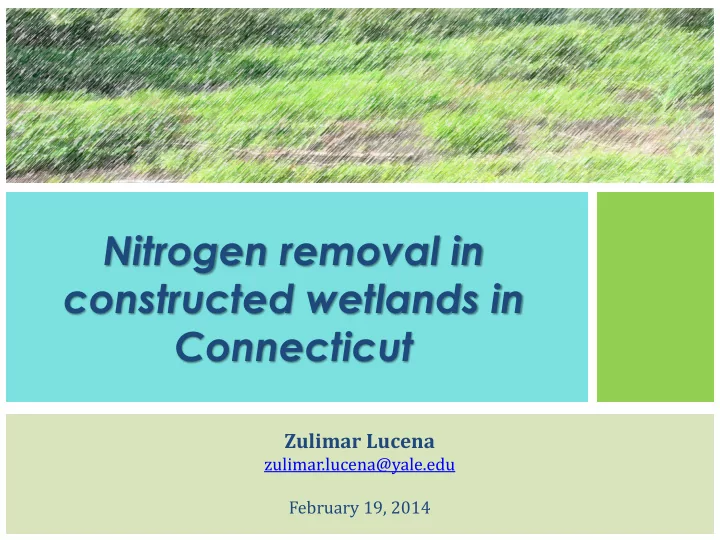

Nitrogen removal in constructed wetlands in Connecticut Zulimar Lucena zulimar.lucena@yale.edu February 19, 2014
Long Island Sound Source: CT DEEP
Objectives • Evaluate the effectiveness of constructed wetlands in removing nitrogen from stormwater in the Long Island Sound Watershed. • Identify the key factors that contribute to stormwater nitrogen removal efficiency in constructed wetlands.
Study Sites Thornton Lake Whitney Davis
Study Sites E Elderslie L M Marion Lois
Methods • Water flow was determined using stage-discharge relationships: • Weirs • Pressure transducers for water level
Methods: Water Quality • ISCO Autosampler 3700 at wetland inlet & outlet • Manual composites • One flow-weighted sample per storm for influent & effluent • Samples were analyzed to determine Event Mean Concentration (EMC) and N loads.
Sample Collection Period Thornton n= 21
Thornton: Removal Rates Lake Whitney
Thornton: Effluent vs. Influent
Sample Collection Period Davis n= 9
Davis: Removal Rates Lake Whitney unmeasured inflow (baseflow and stormflow) results in inflow<outflow
Davis: Effluent vs. Influent NS
Conclusions • Thornton: • Significant biogeochemical N removal • Main mechanism for N removal is hydrologic • Davis: • Hydrology issues • Biogeochemical removal not significant Lake Whitney
Other sites • Lois & Marion • Data from 9 to11 storms • Hydrology issues • Elderslie • Few storms, only one with outflow • Additional data collection
Future Work • Assess explanatory variables • Residence times • Input N concentrations • Wetland-watershed area ratios • Soil organic matter content • Vegetation Lake Whitney
Acknowledgements Funding • CT Sea Grant • Connecticut Association of Wetland Scientists • Hixon Center for Urban Ecology, Yale University • Carpenter-Sperry Fund, Yale University Field Assistants • Lisa Weber • Tatiana Hayek • Jancy Langley • Kevin Sherrill • Michelle Camp • Jocelyn Mahone • Kris Van Naerssen • Uma Bhandaram • Zhemin Xuan • Jamie O’Connell • Michael Kravitz • Bunyod Holmatov
Recommend
More recommend